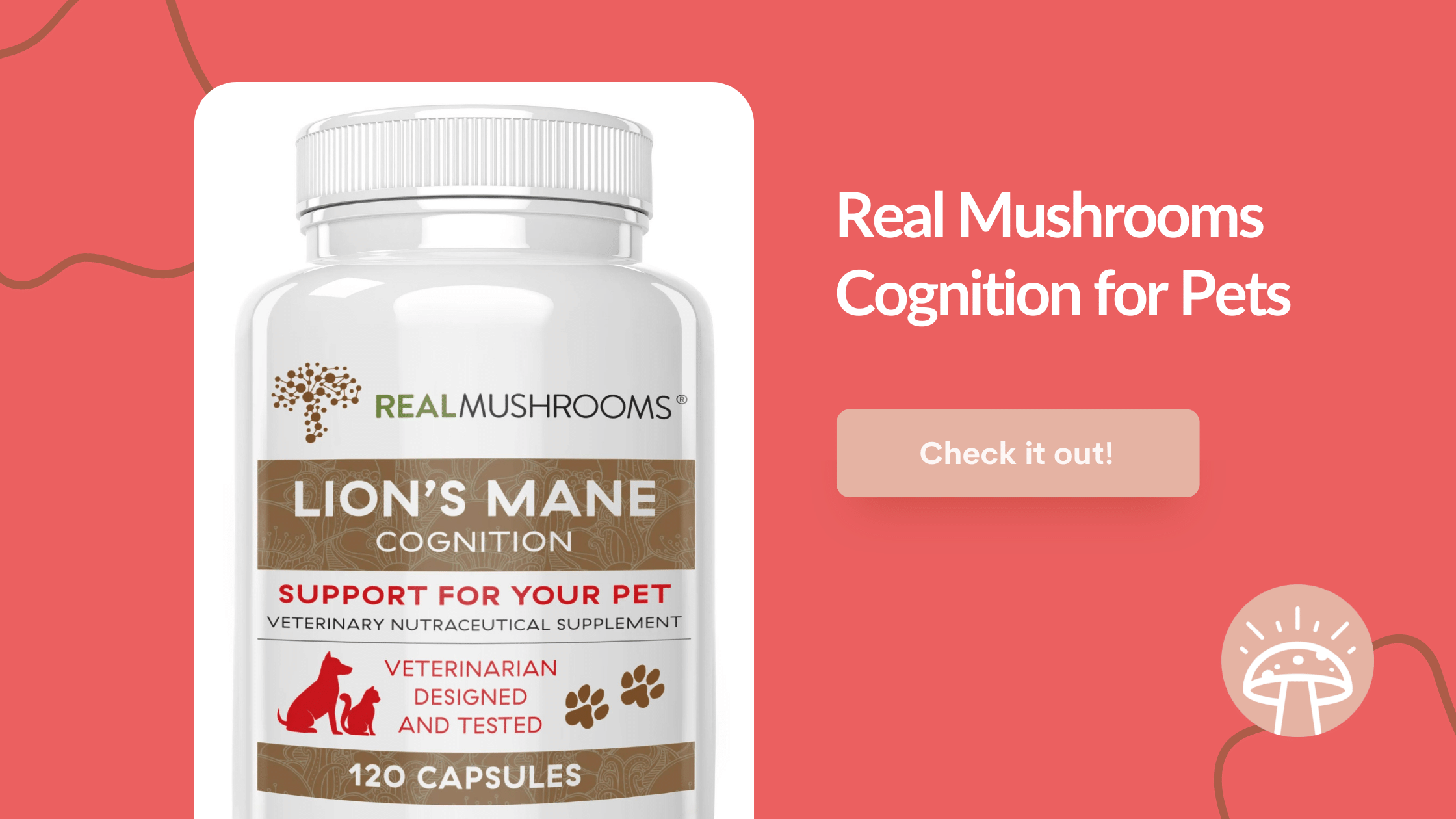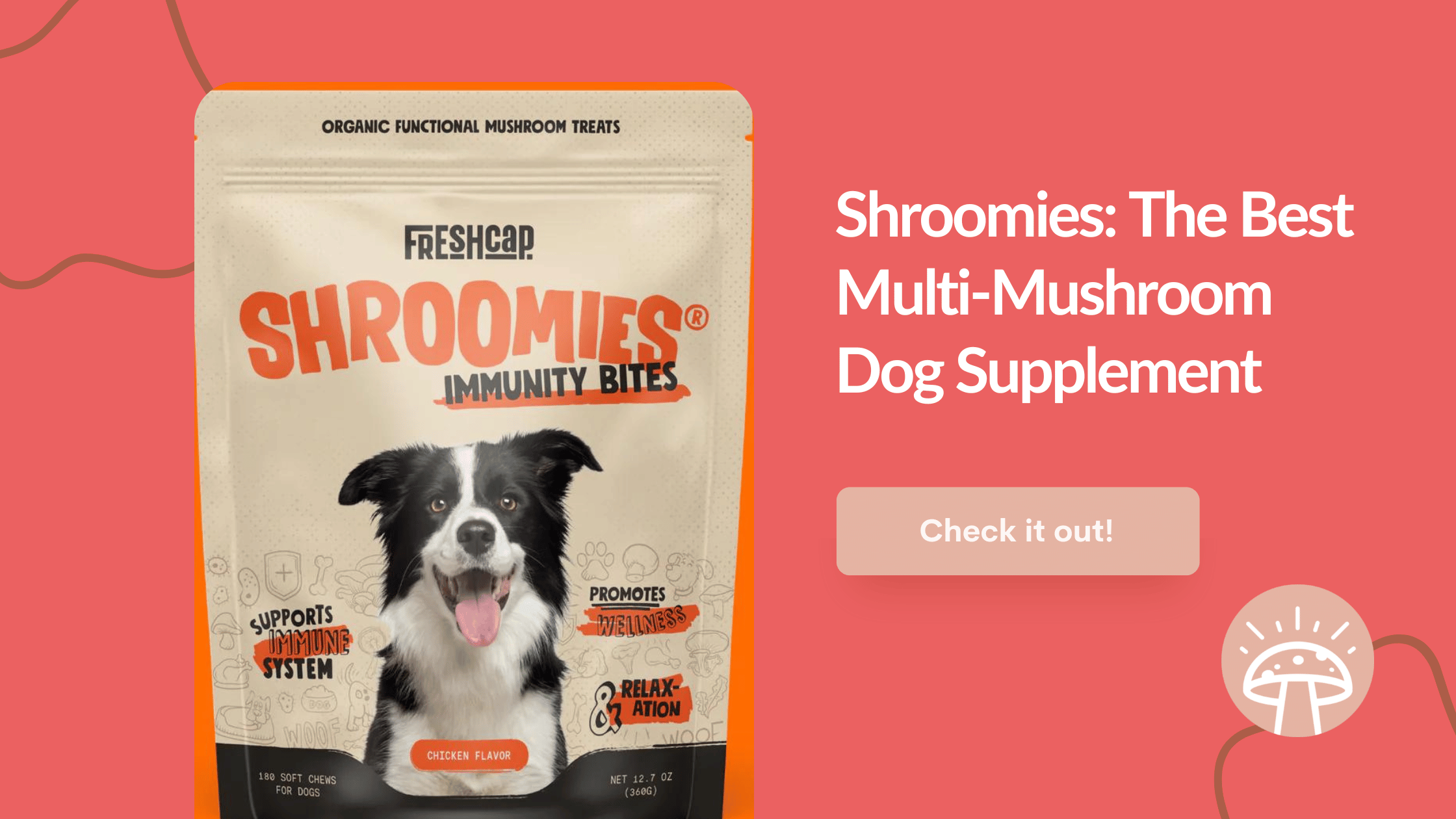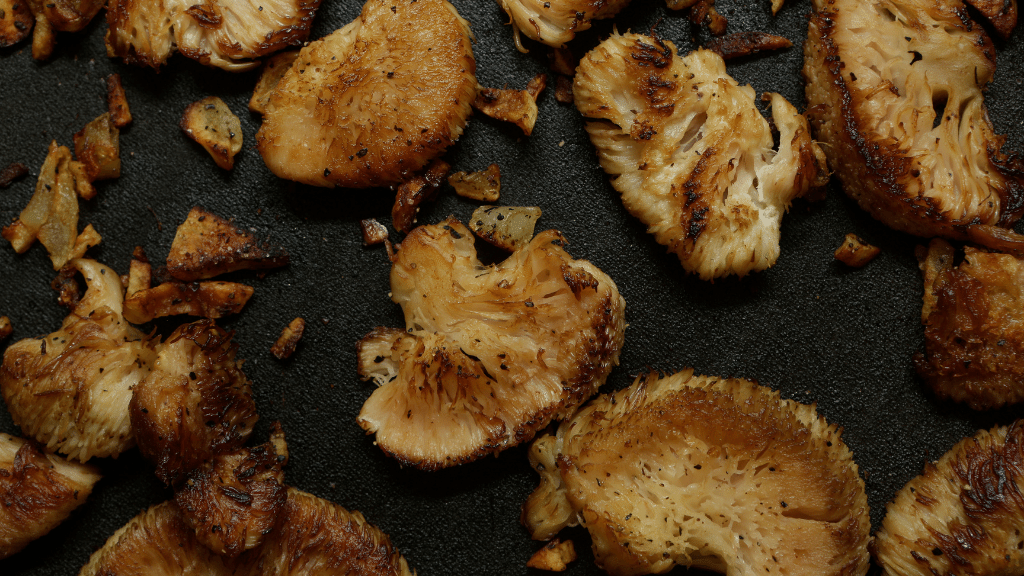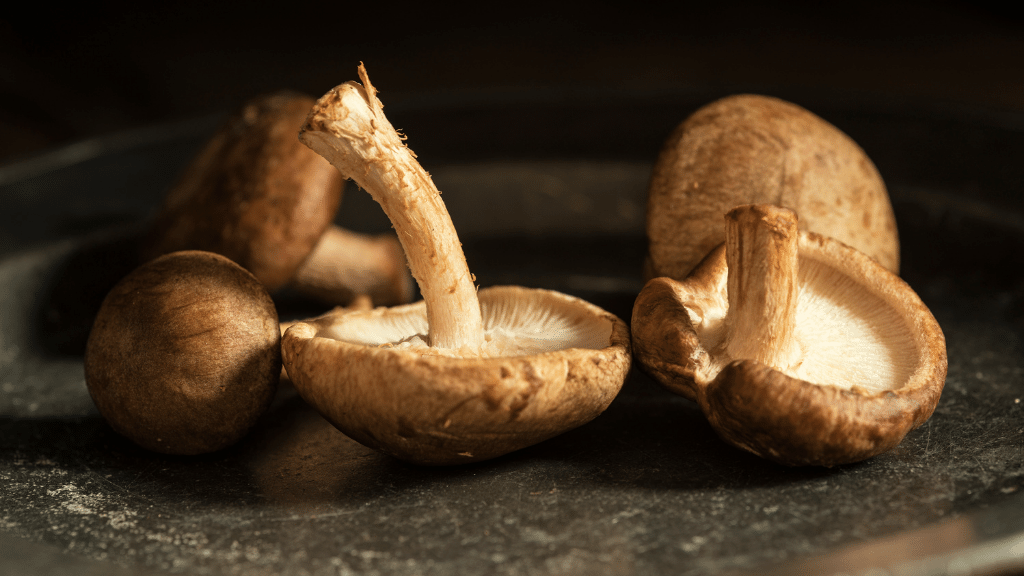Mushrooms have been shown to be a next level way to incorporate more nutrients, vitamins, minerals, and antioxidants into your daily (human) diet – but you may be wondering...
Is it okay to give your dogs mushrooms?
We’ll cut to the chase and answer your question right up front: YES, some gourmet and medicinal mushrooms are okay - even considered good - for your dog to ingest.
But there are some helpful tidbits we can provide to ensure you’re keeping your pup safe while feeding them some fantastic fungi.
If you’re like us at Remeday, we fit the millennial that loves their dog(s) like their child(ren) stereotype to a T. And chances are if you’ve found this article, you do too.
Welcome to the crazy dog parent club. We’re sure that soon you’ll also be part of the crazy mushroom lovers club.
Can dogs eat mushrooms?
Absolutely, yes, it's okay to give your dogs mushrooms to eat. Dogs can have many of the same mushrooms humans can have - but it’s important that they eat them raw, plainly boiled, or powdered. Like all new foods, we recommend giving your dog just a small bite of mushroom to see how they react after a day or so.

We strongly recommend against giving your dogs mushrooms if they've been cooked using any spices, oils, or sauces with them in the same way that you wouldn’t want to feed a lot of the foods you consume at the dinner table to your pets. Oils, fats, and spices are more likely to upset your dog's stomach than the mushroom itself.
What’s interesting about dog food is that they contain a lot more than just animal proteins to fuel your pup’s day - in fact, many of the high quality brands contain healthy grains, fruits, vegetables, starches, and more.
So, why not fungi?
We’ll get into which mushrooms we recommend for dogs shortly, but before we do, we want to be clear that we’re certainly not saying that all of the wild mushroom species found in your yard are awesome for Fido.
Let’s take a closer look at which mushrooms are poisonous for dogs and what to avoid.
What mushrooms are poisonous to dogs?
In the same way that some mushroom species are not okay for humans to eat, the same goes for dogs. Some mushrooms are simply toxic and could have some adverse effects on your dog’s health and wellbeing - but some are straight up deadly.
Most of the mushrooms that are poisonous for dogs (and humans for that matter) grow in the wild. That goes for your backyard, the woods behind your home, a trail you frequent, and beyond.
The mushrooms you need to watch out for are:
- Death Cap (Amanita Phalloides) - Mostly native to Europe, but also sprouting up in woods around the world, the death cap mushroom is tricky because it somewhat resembles many commonplace, safe mushrooms with its white and brown exterior. The main difference is that the cap of the mushroom turns a yellow-ey green over time.
- Fly Agaric (Amanita Muscaria) - The mushroom from our cartoon dreams, the fly agaric is actually incredibly toxic to humans and dogs alike. This red capped mushroom has white spots on it, with a white stalk. It is native to temperate and boreal forests around the world.
- Deadly Webcap (Cortinarius Rubellus) - Also found in temperate parts of Europe, the deadly webcap is another commonplace looking mushroom with a skirt-like cap and brown exterior. Yikes.
- Funeral Bell (Galerina Marginata) - The funeral bell mushroom looks like, you guessed it, a wide bell shape that is also brown. Shocking and frustrating as many of these wild poisonous mushrooms have similar characteristics. The funeral bell contains many of the same deadly toxins found in the death cap, and can be found growing on decaying conifers around the world.
- Destroying Angel (Amanita Virosa) - Native to Europe, the destroying angel is a white capped mushroom that grows in forests and mountainous areas in the UK and Ireland in particular. So far, it has not been found growing in North America.
- Fool’s Funnel (Clitocybe Rivulosa) - Mushroom foragers really like literal names - that goes for the fool’s funnel mushroom that resembles a small white-ish brown funnel with its cap. It’s a fairly commonplace mushroom that is typically found mixed in with edible mushroom species growing in North America and Europe.
- Panther Cap (Amanita Pantherine) - For Europe and Western Asia residents, beware of the panther cap mushroom. It can be identified with it’s brown color and small white veil fragments all over the cap.
- Angel’s Wings (Pleurocybella Porrigens) - This beautiful, yet toxic, mushroom looks like an upside down, splayed white skirt, and can be found growing in forests across the Northern hemisphere on wood decay.
Tips for avoiding poisonous mushrooms with your dog
With all of this in mind and some specific species to watch out for, the helpful tips we have to help protect your dog against any harmful fungi include:
- Educate yourself on IDing what types of mushrooms your dog is and is not allowed to eat
- Scope out your yard to see what types of mushrooms are growing - we recommend not just looking on the ground, but also fallen stumps, tree trunks, and more
- Keep a close eye on what your dog tries to munch while on trail walks
- Many wild mushrooms have poisonous look-alikes, so it’s recommended to not feed your dog any foraged mushrooms
- If your dog eats a mushroom you’re unsure about, take some with you to the vet so they can ID it in the case they have an adverse reaction
- If you can’t bring the mushroom with you, but you saw what it looked like, try to either find a lookalike photo online to show the vet
The truth is that veterinarians often think that fungal-related poisonings are underreported in dogs because they’re not always seen in real time.
This is why it’s better to be safe than sorry.

If the awful situation arises that you think your dog may have ingested a poisonous mushroom, it’s so important to know what to look for. Which brings us to…
How to recognize mushroom poisoning in your dog
First and foremost, if you suspect that your animal has ingested a poisonous mushroom, you should call pet poison control at: 800-213-6680. This line is available to you 24 hours a day, 365 days a year to ensure that no matter when the issue happens, you’re supported.
If you suspect poisonous mushroom consumption, or are just monitoring your dogs symptoms in general when it comes to mushroom ingestion, you should look for:
- Body weakness
- Lack of coordination
- Tremors
- Hallucinations
- Vocalizations of discomfort
- Agitation
- Seizures
- Drooling
- Vomiting
- Diarrhea
- Swollen abdomen/clear abdomen pain
- Collapsing
- Liver or kidney failure
- Coma
Like we said, we really (and we mean really) hope this scenario never arises, but if it does, better to be prepared.
Whew, we just got a little sweaty thinking about that scenario!
Let’s discuss some happier information as it relates to dogs and mushies.
What mushrooms are safe for dogs to eat?
We have a very simple approach that will help you in identifying the best mushrooms to be giving your dog: live by the rule that if it’s safe for you to consume it’s safe for them.
If you are living by this rule, then you can safely assume that gourmet and medicinal mushrooms are a go for doggos.
But, just to be clear, let’s look at what those mushroom species are.
The most common mushrooms that people purchase to either cook or give to their pets raw are:
- White button - Full of helpful nutrients and great fiber, the white button mushroom is most likely to be what you see in your local super market.
- Cremini - Full of helpful nutrients, cremini mushrooms are simply white button mushrooms at a later lifecycle stage.
- Portobello - Same with portobello mushrooms. These are jam-packed with helpful nutrients and fiber.
- Porcini - Porcinis are also known for their wide range of nutrients and fiber.
- Maitake (also considered a medicinal mushroom) - This mushroom may help to prevent cancer, manage diabetes, and support liver health with maitake supplementation for dogs.
- Shiitake (also considered a medicinal mushroom) - With tons of vitamins and minerals, plus fiber to boot, shiitake is a great mushroom to feed to your dog.
The best medicinal mushrooms for dogs include:
- Reishi - Antioxidants in reishi may help to protect your dog’s liver.
- Cordyceps - From boosting physical stamina, to boosting the immune system, cordyceps is a great choice for your dog for overall health and wellbeing.
- Lion's Mane - Give your dog lion’s mane to support brain function, gut health, and heart health. Additionally, lion’s mane can help prevent and/or manage cancer.
- Turkey Tail - Turkey tail helps with management of your dog’s immune response, digestion, liver protection, to help fight cancer, and increase longevity.
- Chaga - Reduce inflammation, fight bacteria and viruses, and attack cancerous cells with chaga mushroom supplementation for your dog.
We’d be remiss not to note that the key to ensuring you’re not overdoing it with mushrooms for your pup is to feed them small quantities and have a strong understanding of what the mushroom is (especially in the wild).
How to feed mushrooms to your dog
While it’s perfectly safe to feed raw gourmet and medicinal mushrooms to your dog, many dogs will not consume them because of the smell and taste. But we have some tips to make it a bit more appetizing for them.
Give these ideas a try:
- Drying your mushrooms - after drying you can either give them to your dog as is or grind them into a powder
- Boiling your mushrooms using an unseasoned and low-sodium vegetable, chicken, or beef broth
- Mixing fresh mushrooms with kibble by blending them in a food processor
- Sprinkling dried mushroom powder over their kibble or into their water bowl
- Chopping fresh mushrooms into small pieces and sauteeing them with a dog-friendly oil (olive oil, for example) and then letting them cool
- Purchase supplements that are dog-friendly
Mushrooms are backed with lots of beneficial dietary fiber. So make sure you also give your dog lots and lots of water if you're supplementing their diet with raw or cooked mushrooms.
Are commercial mushroom supplements safe for dogs?
As with any supplement on the market, it’s important to do your research to identify whether or not a supplement is safe. When it comes to commercial dog mushroom supplements, safety really depends on the quality of the product and the brand.
The best mushroom supplement products for dogs
Here at Remeday, we know that dogs are like family. But with so much marketing out there, it can be hard to know which products are safe, which are effective, and which are the most cost friendly to feed your pet.
This is especially true if you're looking to support a particular condition, such as cognitive decline or even canine cancer.
Here at Remeday, our primary goal is to help you find the best mushroom products. We only ever recommend products we have completed extensive research on, have tried ourselves, and would recommend to friends and family.
The good news is, there are wonderful mushroom supplement companies out there! Here are some of the best ones:
1. Real Mushrooms: Lion’s Mane Extract Capsules for Pets
We love RealMushrooms for a number of reasons. They create supplements using high-quality mushrooms using 100% fruiting body. This means your pet will have the highest chance of getting the most beneficial compounds from the product. These easy-to-administer capsules can be hidden in your dog’s favorite treat for easy dosing. RealMushrooms is a great choice if you want to hide your dog's dosage in a tasty treat!
2. Shroomies for Dogs
If you want to give your dogs all the benefit of lion's mane, plus other dog-friendly functional mushrooms (like shiitake and turkey tail), then Shroomies is the blend for you. We've been lucky enough to chat with the owners of FreshCap. As dog lovers AND mushroom experts, we are certain that this blend is perfect for the dog owner looking for a well-rounded mushroom supplement. In fact, we've even given these to our own dogs - Chonky and Arya!
Looking for more?
We took a look at the top medicinal mushroom supplement brands for dogs and evaluated them all. Take a look at our top mushroom supplements for dogs here.
In general, powdered mushroom supplements are considered safe for dogs to consume - especially for the mushrooms we’ve listed above as dog-friendly.
NOTE: Your powdered supplement brand doesn't necessarily need to be made for dogs to give to your dog. Just make sure you check the COA and ingredient list to ensure there aren't additives or other ingredients that may harm your dog. Dog-safe options will be free of these which makes them an easy choice.
If you’ve found a supplement you’re interested in trying with your dog, we recommend first asking your vet if that’s a good choice for your dog, and then discussing the supplement with the company that creates it to get their take on if it’s dog-friendly.
They’ll be able to provide a Certificate of Analysis (CoA) for how the product was made to prove validity.
Can I give my dog mushroom tinctures?
Wondering if it's okay to give tinctures to your dog? Many people worry that the alcohol content in many tinctures will be harmful. Just like humans, most healthy dogs can tolerate a very small percentage of alcohol. Some dogs are very sensitive to alcohol, especially smaller breeds, so always start with a very, very small dose.
You may want to consider researching tincture brands that use a glycerin base or are alcohol-removed.
If part of a meal or used with some water, the alcohol is unlikely to have any negative effects.
We recommend adding the appropriate dosage of tincture to your dog's kibble rather than giving it to them directly.
As with any commercial product not designed for dogs, always check the ingredient list and work with your veterinarian or pet nutritionist to determine the best mushroom type and brand for your dog.
What are the potential benefits to feeding dogs mushrooms?
As mentioned earlier in this article, mushrooms are full of numerous beneficial nutrients (think everything from amino acids, to vitamin A & B, fiber, protein, antioxidants, copper, enzymes, iron, magnesium, and more).
This makes them a great choice for both humans and dogs alike. For dog owners, you likely want to extend longevity for your dog by boosting overall health and prevent cancer cells from forming to keep your dog living a healthy and long life.
There have been numerous studies conducted on animals that show how mushroom supplementation may also be valuable for dogs.
A sampling of some of these studies include:
- Reishi may improve lifespan
- Lion’s mane may help with brain health and cognitive function
- Chaga has been shown to have anti-cancer effects
- Shiitake may improve immune response
- And much more!
Please note that although these studies have been conducted on animals, there are not many studies completed on dogs. More research needs to be done to backup all of these claims for dogs in particular.
Looking for more? Tune in to this incredible podcast featuring Dr. Patti Mayfield:
A final note on mushrooms for dogs
So, in summary, yes! - mushrooms are definitely worth exploring as a potential dietary supplement for your pup.
With everything shared above, it’s so important to give your dog mushrooms in moderation as to not upset their normal balanced diet.
Bon appetit pooch!








.png)
